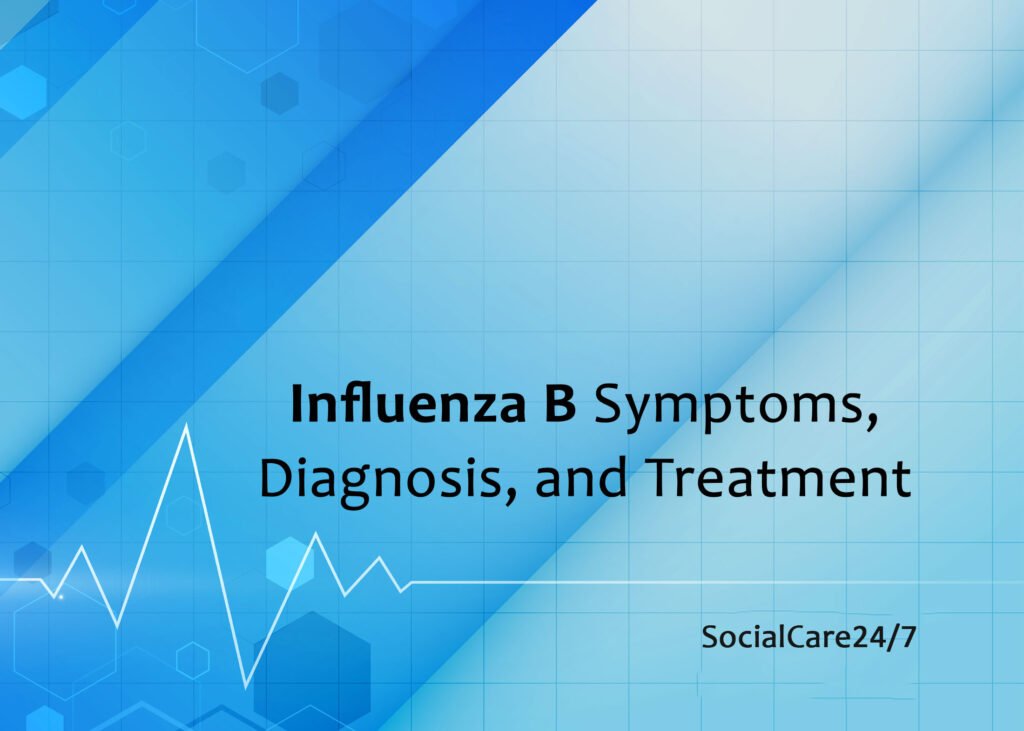Many believe influenza B is a major cause of winter flu. It can exhaust and sicken people. Kids, the elderly, and sick people are most at risk from the flu virus. This article discusses Influenza B symptoms, diagnosis, and treatment. Knowing these indicators helps people obtain aid quickly and avoid unnecessary issues.
What is Influenza B?
Two primary flu viruses spread each winter. They include influenza B. Though less frequent than influenza A, many people catch the flu yearly. The virus spreads swiftly through droplets when ill people cough, sneeze, or talk.
Influenza B can make your life unpleasant, even though it’s usually not as severe as Influenza A.
Symptoms of Influenza B
Like Influenza A, Influenza B symptoms can range from mild to severe. These symptoms are most common:
- Fever and Chills: Fever and chills are frequent symptoms of Influenza B. This happens typically 24 hours after an incident.
- Headache: Influenza B causes mild to severe, long-lasting headaches in many persons. Headaches make everything complicated.
- Aches and pains: When you have influenza B, your body may suffer, which can make sleeping difficult.
- Weakness: Fatigue is an indication of the flu, including Influenza B. People with the illness may be too exhausted to complete ordinary tasks.
Respiratory Symptoms
Influenza B patients often have problems breathing. Here are some:
- Congestion: Many people have trouble breathing through their noses due to influenza B.
- Cough: Flu patients generally have a persistent dry cough. Some folks get throat soreness.
- Throat Pain: Inflammation from the virus might worsen a painful throat when you cough or swallow.
Gastrointestinal Symptoms
Stomach issues are less common than lung issues in Influenza B patients. Some of these signs:
- Nausea: Sick patients may have trouble eating and drinking.
- Vomiting: Kiddies can get sick from Influenza B. You should drink lots of water now.
Onset of Symptoms and Duration
Most influenza B patients become sick one to four days after exposure. Age, other health issues, and treatment speed can affect symptom severity and duration. You may feel worse during the first few days and a week afterward.
Most individuals feel better after a few days, although some may cough or be tired for two weeks. To heal quickly, rest and drink lots of water.
Who gets severe flu symptoms most often?
Influenza B can affect everyone, although some people have worse symptoms. Here are some:
- Young children: Influenza B is more dangerous for children under five. The infection can cause asthma and dehydration.
- Elderly adults: Due to weaker immune systems, 65-year-olds are more prone to catching Influenza B.
- Individuals with chronic conditions: People with asthma, diabetes, heart disease, or other health concerns are more likely to be extremely sick.
When to see a doctor
Influenza B usually heals with rest and liquids in a week, but others need medical attention. If you develop these symptoms, visit a doctor immediately:
- Trouble breathing or lack of air
- Chest pain or tightness.
- Lost or confused
- Low bodily water (dizziness, black urine, dry mouth)
- From better to worse after improving
These symptoms may indicate asthma or heart failure, requiring immediate medical attention.
How to Avoid Influenza B
Flu shots are the most excellent method to avoid influenza B. People get flu shots yearly to prevent emerging Influenza A and B strains. This three-part vaccine protects against three key flu strains, including one type B strain.
Flu shots aren’t the only strategy to prevent influenza B. The following also apply:
- Handwashing with soap and water reduces the risk of the infection.
- Do not contact sick individuals.
- Clean often touched light switches and doorknobs.
- Cover your face when coughing or sneezing to prevent nasal droplets from spreading.
Options for treating influenza B symptoms
Even though Influenza B normally goes away on its own, medications can reduce symptoms and expedite healing. Some are:
- Rest and hydration: To heal, drink lots of water and relax.
- Typical OTC drugs: Acetaminophen and ibuprofen are over-the-counter medications for fever, headache, and body aches. Ask a doctor or nurse before giving children medication.
- Antiviral drugs: If you catch the flu early, Tamiflu or Relenza may reduce your symptoms and illness time.
Conclusion
Influenza B symptoms can be severe and disrupt daily living, but most people recover without complications if they take care of themselves. Fever, body pains, weariness, and a sore neck can be overwhelming, but rest, hydration, and pain treatment typically help. Knowing the symptoms and seeing a doctor if they worsen can help prevent Influenza B.
This is essential for youngsters, the elderly, and those with health issues. Avoiding illness is essential, and the flu shot is still the best method to reduce your risk or severity. Along with vaccination, washing hands, avoiding ill people, and disinfecting surfaces can prevent the infection.
Staying informed, ready, and vigilant can help you manage Influenza B symptoms and safeguard your health and others.
Source links:
https://www.verywellhealth.com/flu-b-symptoms-identify-treat-and-prevent-5216276



